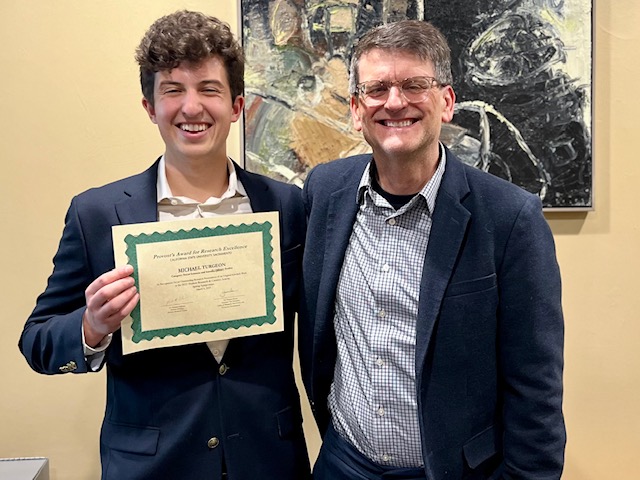Support Page Content
Turgeon wins prestigious award
Fall 2022 MPPA graduate Michael Turgeon won first place in the Social Science and Interdisciplinary category in a campus-wide Student Research and Creative Activity competition held on March 6, 2023.
He now has the opportunity to compete in a similar CSU-wide competition held at San Diego State University in late April.

Congratulations, Michael!
The abstract and presentation contained below offer a summary of his research.
Abstract
Introduction
Public health research suggests that children exposed to various forms of environmental pollution through sources such as ambient air or drinking water may suffer from impaired brain development or chronic conditions like asthma. These health impacts may hinder a child's ability to succeed in the classroom, which has implications for educational attainment, lifetime earnings, and persistent disparities in educational and economic outcomes. This paper aims to quantify the long-term impacts of these pollutants on academic achievement in California.
Methods and Results
I apply a fixed-effects panel regression analysis to estimate the influence of localized pollution variables on average test scores from 6th graders in California public school districts from 2009-2018, while controlling for potential confounding factors. I find statistically significant negative effects on either reading or math scores from proximal levels of 1) fine particulate matter in ambient air, 2) solid waste facilities, and 3) a group of pollution sources linked to poor drinking water quality. One standard deviation increase in fine particulate matter decreases average reading scores by 2.75%, while similar increases in solid waste facilities and water quality threats decrease average math scores by 1.75% and 0.96%, respectively.
Conclusion
My findings suggest that pollution mitigation strategies, such as improved classroom air filtration, may be a cost-effective education intervention that offers an equitable distribution of benefits. Future research is needed to examine other pollution variables that were incompatible with my panel data model and to further delineate the causal mechanisms connecting pollution exposure to academic achievement.